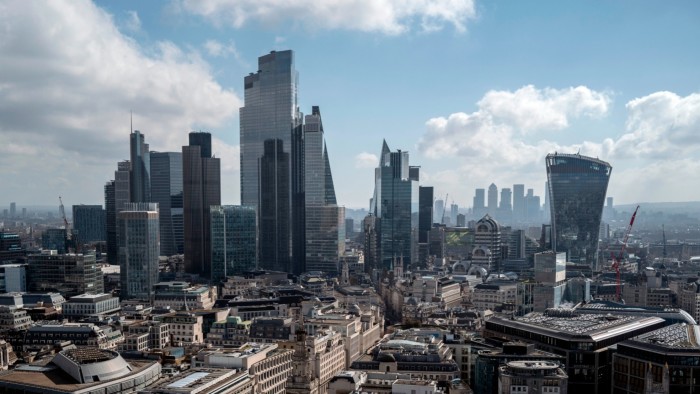Unlock the Editor’s Digest for free
Roula Khalaf, Editor of the FT, selects her favourite stories in this weekly newsletter.
Much the most important economic problem the UK confronts is long-term stagnation of productivity. That was the theme of my column two weeks ago. Yes, the turmoil of the moment cannot be ignored. But the urgent is not necessarily the important. Barring a catastrophe (a world war or global depression, for example, about either of which the UK can do little), the main determinant of our prosperity and stability will be decisions made by — and within — this country. The economy must be lifted out of its almost two decades of slump.
This is not to argue that Donald Trump’s war on the open world economy is irrelevant. How can it be? He is raising huge and unpredictable barriers to global commerce and, at the same time, destroying the institutional architecture his wiser predecessors created over eight decades. Nevertheless, this in itself is unlikely to be the end of the economic world, at least for the UK.
According to the Office for National Statistics, the UK exported £59bn worth of goods to the US in 2024, just 16.2 per cent of total exports of goods. Its £137bn worth of services to the US, 27 per cent of total exports of services, were far more significant. The details of UK exports to the US underline the contrast. The category of services with the largest exports to the US was “other business services”. These amounted to £61bn in 2024, which was 33 per cent of all exports of other business services. Remarkably, exports of other business services to the US were worth more than those of all goods combined. The biggest category of goods exports to the US was machinery equipment, at a modest £29bn. Moreover, only 19 per cent of exports in this category went to the US.
This is a good position for the UK to be in. Trump — in this respect very similar to homegrown Brexiters — does not seem to care very much about services. That, the Maga fanatics feel, is not what “real men” do: they make steel or mine coal. Moreover, tariffs cannot apply to services.
The indirect effects of Trump’s policies, both economic and broader, are far harder to analyse. As Megan Greene noted on April 25, the uncertainties multiply in every direction. It is certainly hard to see an upside for the UK, other than the opportunity to entice top-class people to work in a country that still clings to the idea of the rule of law.
Yet the main implication of the Trump shock is that good policy becomes even more important: it always does in difficult times. In general, the aim should be to make the fiscal position and financial system more resilient, enhance the flexibility of the economy and substantially increase investment in human, physical and intangible capital — public and private.
Unfortunately, there is no way such things can be done in a country with slow productivity growth and a large current account deficit, without suppression of consumption. This is a truth no government wishes to confront. But, according to the IMF, the UK’s average national savings rate between 2021 and 2024 was 15.6 per cent of GDP, which put it 35th out of 37 high-income countries, ahead only of Cyprus and Greece. This has to rise if the UK’s low investment is to do so, too.
Yet the ability to fund higher investment is just one necessary condition of faster growth. There must also be opportunities in which to invest. Some of these will be produced by appropriate deregulation, such as relaxation of planning controls and elimination of the more absurd environmental restrictions and excessive curbs on employment flexibility. But others will require effort. In particular, growth means change and so requires innovation. This is a risky and costly process with many positive externalities: a successful new activity will almost always share the benefits of its pioneering with others.
This is why there is a sound case for government support for innovation. The question is how to do this. David Willetts, a former Conservative minister, has just published a short pamphlet for the Resolution Foundation on “How to do industrial strategy”, which explores possibilities. My view is that the costs of not taking the risks of failure exceed the costs of taking them. It is pretty clear, as Alexander Hamilton believed, that government can and should act as a catalyst for change. There will be many failures. But there is a good chance that there will also be successes. A country as mired as the UK in stagnation has to risk the former if it is to achieve more of the latter.
The big point I have been hammering home for some time is that the more perilous the world and the worse the economic performance, the more damaging is the UK’s reflexive conservatism. Fortune favours the brave.
Follow Martin Wolf with myFT and on X
Read the full article here




